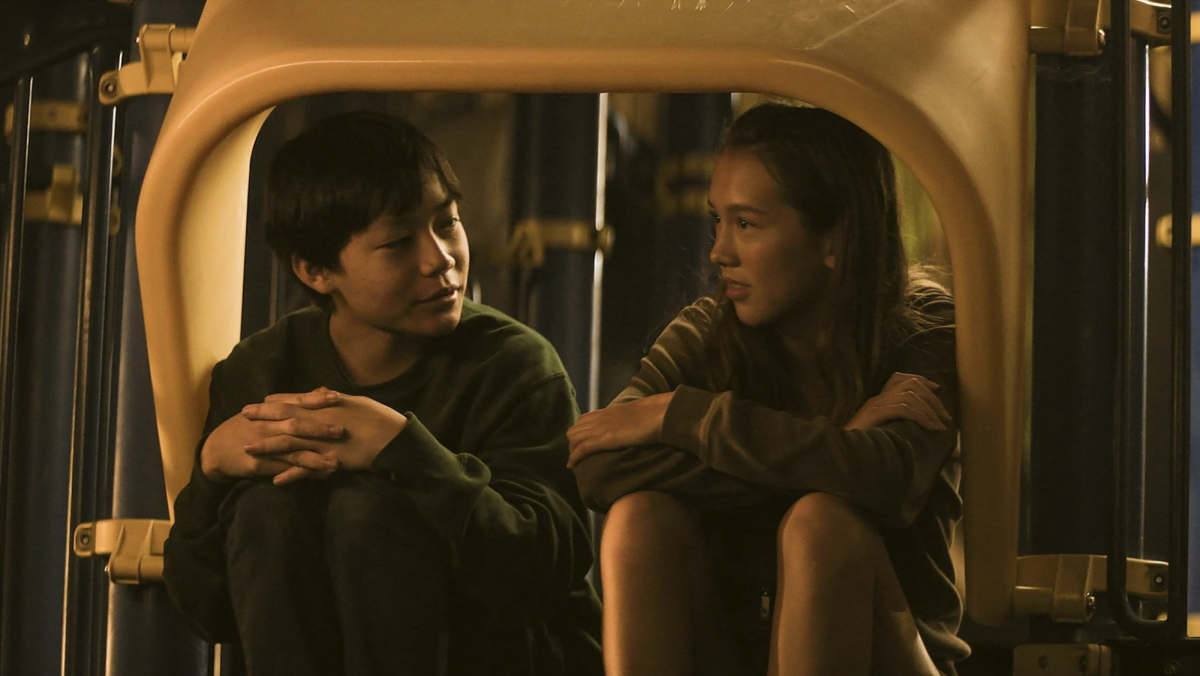
Growing up is a painful, joyful mess. From a simple snapshot of a single summer, director and writer Sean Wang details the experience of those inevitable growing pains in “Dìdi”, a vibrant, warm and all too familiar portrait of what it is to be a teenager.
“Dìdi” focuses on rising high school first-year Chris Wang (Izaac Wang) as he spends his last summer before high school spending time with his childhood friends, Fahad (Raul Dial) and Soup (Aaron Chang), attempting to have even a single conversation with his crush Madi (Mahaela Park) and navigating his home life with his mother Chungsing (Joan Chen), sister Vivian (Shirley Chen) and his grandmother, Nai Nai (Zhang Li Hua), which begins to feel more fragile than it once seemed.
The movie’s simplistic narrative allows for the writing to create a distinct identity for “Dìdi” with an effective blend of comedy and drama. While the beginning sets a light-hearted tone through its detailing of Chris’ various shenanigans, such as his meticulous MySpace stalking of his crush and his urine-related revenge against his sister after a fight, the latter half adds a layer of loneliness and desperation that gives significant depth to the production.
While Chris continues to commit one arguably reckless act after another, there are small details that shift these moments into a different, more sober light. For example, Chris’ regular comedic brand of teenage insanity appears when he swallows a blunt in an effort to fit in with an older crowd at a party. This ridiculous, hilarious act quickly turns devastating with the addition of a small detail: as the crowd chants “Asian Chris”, he falsely claims he’s half-Asian. These details serve to characterize Chris as more than just a stereotypical rebellious teen — he’s a reckless kid who attributes his loneliness and failures to his current identity.
Additionally, the small quirks present through the editing and camera work further add to the movie’s storytelling. The fast-paced cuts and close-ups during Chris’ hangouts with his friends, particularly in a scene where they discover a dead squirrel and end up blowing it up in a mailbox, bring a chaotic energy that naturally appears with a group of adolescent teen boys. Personal camera footage showing Chris’ videos is interspersed throughout the movie, evoking nostalgia as the audience is put in the position of a viewer of a late aughts YouTube video.
However, amongst the chaos, there are clear contrasting moments of calm. These scenes contain more patient stills and cuts that focus on Chris’ home life with his mom, grandmother and sister. The effectiveness of this contrast is seen most in Chris’ and Vivian’s relationship. The two are constantly at odds, which usually culminates in shouting matches, but there are also moments of silent comfort, such as when Vivian helps Chris deal with the aftermath of his stunt at the party. They sit together in one frame as she patiently stays with him, covering for his sickness and comforting him.
The performances further add to the charm of “Dìdi”. Wang’s performance as Chris is full of both the infectious energy and the tumultuous emotions that Chris holds. He effectively portrays the growing insecurity that Chris begins to notice as his childhood friends seem to start clicking with others more naturally in comparison to his awkwardness and the desperate push to try to fit in no matter what. Chen’s performance is another standout, highlighting Chungsing’s own loneliness as she struggles to connect with her increasingly volatile son, manage life with a mother-in-law who criticizes her every move and come to terms with the multiple failures she faces as she pursues her dream of becoming an artist.
Furthermore, the chemistry between Chen and Wang gives life to the complex mother-and-son relationship between Chungsing and Chris. Wang’s energy brings to life Chris’ consistent rebellion against his mother and Chen’s quiet strength portrays a Chungsing who will hold on to her son, no matter what he says or does. The movie’s last scene displays this particular love in a late dinner after the first day of high school where the two sit in a comfortable silence around the kitchen table in a silent house, watching one another with a clear deep-rooted patience and care.
Above all, “Dìdi” clearly understands the complications of teenagehood. It’s a time when you will fall and mess up, where you will become increasingly self-aware of aspects of yourself you don’t want to be self-aware about. “Dìdi” manages to craft these emotions into a story that will resonate no matter what era you were raised in, creating an ode to an age of constant chaos that everybody encounters on their way to adulthood.




















